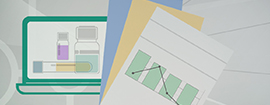QC Process and Design
Learn More about QC Process DesignFeatured Content

Optimizing QC Procedures
Quality control management is an essential task in the clinical laboratory. While many labs have well-established QC processes in place, they need to be reviewed periodically.

Establishing Best Practices in Quality Control Management
While juggling compliance requirements and navigating budget concerns have always been pain points for lab managers, new challenges must be addressed.

5 Tips for Evaluating Your Current QC Vendor
To help maintain the highest standards of quality control, labs must periodically evaluate whether their current vendors are meeting their needs.

Severity of Harm Category Designation Survey Results
Knowing an assay's Severity of Harm category is a key component in performing a Risk Assessment to determine acceptable QC practices. For the first time, labs have a starting point for determining the appropriate category. This poster shares responses of 261 surveyed laboratory professionals from 40 countries. Participate in the survey by scanning the QR code in the poster.
Featured Content
Laboratory Management
Learn More about Laboratory ManagementFeatured Content

Gaining & Maintaining Lab Accreditation
What sets a lab apart when it comes to quality? Accurate, consistent results and quick turnaround times are important, but accreditation can also help demonstrate the lab’s commitment to providing the highest quality possible.

Preparing for a Stress-Free QC Audit
Failing an audit can result in potential fines, the need for re-audits, and a damaged reputation. The good news is there are many preventive measures laboratories can take before an inspection to help prepare.

Best Practices and Continuing Education for Lab Personnel
Lab personnel play a critical role in ensuring accurate and efficient testing results. As the demands and complexities of the field continue to increase, it becomes essential to focus on skill development for lab staff.

Quality Control Value Assignment Program
Bio-Rad is a leader in independent quality controls with the world’s largest QC peer group program. QC Value Assignment testing is critical in contributing meaningful data to support our diverse global QC customers and plays an integral part in the release of new assayed quality control lots. When participating in the QC Value Assignment Program, clinical laboratories and other organizations can earn money while contributing data toward establishing analyte recovery means and ranges for Bio-Rad quality control inserts. Together with our industry-leading Unity data management software, our QC Value Assignment Program can help laboratories increase confidence in the reliability of patient test results.
Featured Content
QC Data Management
Learn more about QC Data ManagementFeatured Content

Is It Time to Upgrade Your QC Testing Data Management Systems? Key Questions to Consider
QC Data management plays a crucial role in the effectiveness of QC testing. A powerful data management solution has the ability to develop effective QC strategies and manage risks.

How the Right QC Provider Can Help You Meet Accreditation Requirements
Bio-Rad Laboratories provides a wide range of simple, effective solutions to help meet general regulatory/ accreditation standards and provide greater confidence in the laboratory’s performance.

The Value of the Unity QC Peer Reporting Program
A laboratory’s value is only as good as its documented performance. Analytically capturing precision, reliability, and efficiency is crucial to properly evaluate your Quality Control (QC) system. Learn how the Unity QC Peer Program helps labs quickly identify trends and troubleshoot QC errors.

Unity Training Videos
Whether you need help configuring our Unity data management software to fit your lab’s designs and goals, or you require training on how to use Unity’s basic or advanced solutions, we offer a broad range of educational and training videos and other resources.
Featured Content
QC Troubleshooting and Solutions
Learn More QC Troubleshooting and SolutionsFeatured Content

Troubleshooting & Recovering from An Out-of-Control Event
An out-of-control event occurs when a quality control (QC) rule evaluation for one or more QC measurements produces unacceptable results. Learn more about troubleshooting and recovering from an out-of-control event.

The Cost of Quality: Managing Risk to Ensure Confidence in Patient Test Results
Lab professionals everywhere recognize that preventing adverse incidents is far preferable to implementing corrective actions once an issue has occurred. Learn about the cost-of-quality processes and managing risk.

5 Ways to Save Money by Avoiding Costs due to Poor Quality
Understanding how to identify good versus poor quality costs can help labs understand how to reduce expenses. Learn how to best identify, track, and manage the quality costs in your laboratory.

QC strategies for risk management
Quality control design has historically focused on instrument performance. Learn how new risk management-based approaches have changed the focus to prevent erroneous patient results.

Best practices to recover from an out-of-control event
QC results are flagged daily, and labs may have different procedures to resolve the issue. Learn how to recover from an out-of-control event and evaluate patient results after recovery.
Featured Content
The Value of Bio-Rad QC
Learn More about The Value of Bio-Rad QCFeatured Content

The Benefits of Independent QC
Quality control (QC) plays an important role in laboratory testing, enabling labs to monitor the analytical quality of a procedure, detect errors, and help ensure the reporting of accurate and reliable patient test results.

Powering Exceptional Labs: The Value of a Bio-Rad Partnership
Quality control (QC) plays a pivotal role in laboratory operations, and effective QC programs are essential for helping ensure reliable outcomes. Learn how Bio-Rad can help identify and support lab's unique needs.
Independent QC Training
Choosing a Quality Control Product
Choosing the right QC product requires careful consideration. This video covers what laboratory managers should consider when choosing the highest quality control product, including length shelf life, right material for the test system, and other factors. conditions. If your QC plan includes less than optimal QC frequency, ranges, and rules, you may be headed toward unreliable results without warnings.
Featured Content
QC Training and Continuing Education
Featured Content

QC Data Management Training & Education
Get training on Bio-Rad's leading QC data management tool, Unity software, which enables labs to connect and compare data worldwide with QC peer groups.

EQAS Training & Education
Access our extensive training and educational resources on EQAS, including a user guide as well as setup, and data submission instructions.

QC Articles
Optimize your QC processes with best practices. We offer articles in all aspects of QC.
QC Workbook Series

Raise Your QC Skills to the Next Level
Introducing free P.A.C.E.-approved QC Workbooks,Bio-Rad is committed to help achieve your quality goals in the pathfor a higher standard of quality patient care.
Available QC Workbooks:
- Basic Statistics in Laboratory Quality Control
- Laboratory Quality Control Materials
- Quality Control Process Optimization with Cost of Quality Application

Basic Statistics in Laboratory Quality Control
Throughout this digital workbook, learn basic laboratory quality control (QC) statistics, Levey-Jennings (LJ) charts & statistical rules, comparative evaluations and background on crossover and lot change studies, and updated guidance.

Laboratory Quality Control Materials
Learn how to use Analytical Goals in Unity Real Time 2 as a retrospective or ongoing review tool that can help you optimize QC effort and cost.

Quality Control Process Optimization with Cost of Quality Application
In this digital workbook, learn the essentials of cost-of-quality thinking, such as how to apply a QC process flow chart to your laboratory’s QC program, as well as how to calculate the costs of a failed laboratory process.


